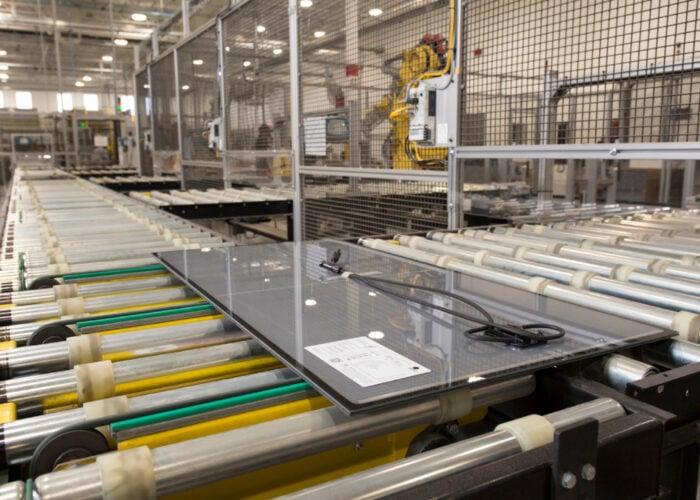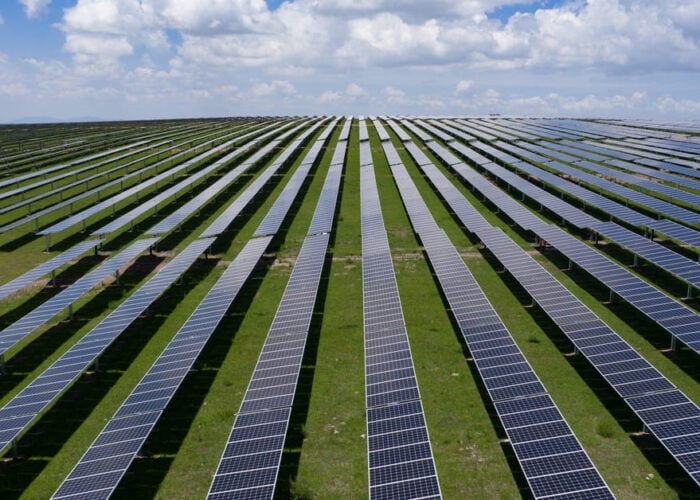
Companies delayed or cancelled US$14 billion in investments in clean energy projects in the US in the first four months of this year, amid growing uncertainty as to the future of renewable power under the Trump presidency.
This figure comes from a report published by research platform E2 and the Clean Economy Tracker, which found that, between January and April of this year, businesses announced the closure or consolidation of 21 clean energy projects, eliminating 10,000 new jobs in the renewable power and clean vehicle sectors.
Try Premium for just $1
- Full premium access for the first month at only $1
- Converts to an annual rate after 30 days unless cancelled
- Cancel anytime during the trial period
Premium Benefits
- Expert industry analysis and interviews
- Digital access to PV Tech Power journal
- Exclusive event discounts
Or get the full Premium subscription right away
Or continue reading this article for free
There is a clear relationship between the cancellation of projects and Trump taking office in January, with the 21 projects scrapped in just the first four months of this year already more than the 15 projects cancelled in the whole of 2024. This trend is shown in the graph below.
While this has not led to a complete withdrawal of investment in new clean energy projects – E2 and the Clean Economy Tracker report that businesses announced nearly US$500 million in new solar, electric vehicle (EV) and grid facilities in April alone – their figures suggest that more investment has been cancelled thus far in 2025 than announced in new projects. Indeed, 2025 is on pace for around US$42 billion in cancelled investment, a figure that would be more than double the total investment announced for the clean energy sector in 2024.
The majority of these project cancellations have been in the storage and EV sectors, with E2 and the Clean Economy Tracker reporting that investors in these industries have scrapped US$10.3 billion and US$6.3 billion of investment so far this year, respectively.
This is not entirely surprising as these sectors have seen the most total investment announced – US$42.2 billion in storage and US$82.4 billion in EVs – but the proportion of cancelled funding as a percentage of new funding announced is striking; project cancellations in the storage sector are valued at around one-quarter of the new funding announced this year, the second-largest proportion behind only the wind sector. These trends are shown in the graph above.
The solar industry, meanwhile, has emerged relatively unscathed so far this year. Its lost investments of US$2.9 billion are smaller than similar cancellations in the wind, storage and EV sectors, and only one solar project has been scrapped so far this year, fewer than any other technology type, including green hydrogen. Indeed, just six solar projects have been cancelled since 2023, according to data tracked by E2 and the Clean Economy Tracker, compared to six wind projects, 13 storage projects and 16 EV projects. This trend is shown in the graph below.
Indeed, the only solar generation project to be consolidated in 2025 is the Ivanpah facility near the Nevada-California border, a 392MW concentrated solar plant that will slash its capacity by two-thirds and transition to solar PV generation.
The other five cancellations have been in the manufacturing sector, and include Meyer Burger’s abandonment of module production in Arizona, which was announced earlier today, and REC Silicon’s termination of polysilicon in Washington following a failed purity test last December.
A ‘costly attack’ on US renewables
Much of the impetus behind these cancellations comes from the Trump administration’s efforts to cut support for renewable energy manufacturing, seen most sharply in the House of Representatives’ passage of a bill that will slash almost all Inflation Reduction Act (IRA) tax credits for renewable energy projects. While the bill needs to pass the Senate, and so is still subject to change, the severity of cuts suggests that the president will do more to undermine the US renewable energy sector than many assumed.
Last year, Wood Mackenzie said that it would be “unlikely” a second Trump presidency would significantly undermine federal support for renewable energy projects, such as the IRA. The analyst argued that many Republican states have benefited from IRA policies, which have helped create new jobs and secure US energy independence, regardless of individual politicians’ scepticism regarding the value of renewable energy power.
The E2 and Clean Economy Tracker figures show that the majority of cuts will affect Republican-led regions, with Republican districts losing more than US$12 billion in investment and over 13,000 jobs that were once announced.
Indeed, through April 2025, 61% of all clean energy projects announced, 72% of all new jobs created and 82% of total investments were made into districts represented by Republicans, suggesting that Trump considers regions governed by members of his own party acceptable collateral damage as he looks to cut support for renewable power.
“Now is not the time to raise taxes on clean energy and compound the business uncertainty that is clearly taking a greater and greater toll on US manufacturing and jobs,” said Michal Timberlake, E2 communications director. “Businesses are now counting on Congress to come to its senses and stop this costly attack on an industry that is essential to meeting America’s growing energy demand and that’s driving unprecedented economic growth in every part of the country.”
There is also confusion regarding the impacts of the latest bill, with Mike Carr, head of the Solar Energy Manufacturers for America (SEMA) Coalition telling PV Tech Premium last week that there may well be “unintended consequences on the manufacturing and deployment side.” Considering the scale of renewable energy investments already announced, even the slightest element of uncertainty seems to have been enough to encourage investors to pull the plug on their projects.
This is to say nothing of the outright hostility to renewable power that many in the industry now associate with the administration. Abigail Ross Hopper, president of the Solar Energy Industries Association (SEIA), told PV Tech Premium at this year’s Intersolar trade show in Germany that such a dramatic attack on policy support for renewable energy investment would amount to “punishing companies that have done exactly what the government asked them to do.”






